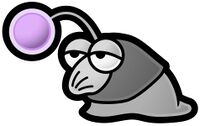Puni elder: Difference between revisions
From the Super Mario Wiki, the Mario encyclopedia
Jump to navigationJump to search
mNo edit summary |
No edit summary Tags: Mobile edit Visual edit |
||
| Line 11: | Line 11: | ||
|Jap=オババ | |Jap=オババ | ||
|JapR=Obaba | |JapR=Obaba | ||
|JapM=A pun | |JapM=A pun of「お婆さん」(''obāsan'', grandmother) and 「婆」(''baba'', old woman). She is called プニ<span class=explain title="ぞく">族</span>のオババ in the Trouble Center list. | ||
|Fra=Matriarche | |Fra=Matriarche | ||
|FraM=Matriarch | |FraM=Matriarch | ||
Revision as of 22:12, August 16, 2021
- “Oh, stop with the whining! You never interrupt an elder mid-lecture! NEVER! You wonder why the other Punies call you a "doofus" sometimes? That's why. And your time to be a doofus is over, because you have to lead our Puni tribe one day! That day is not far off! ...And THAT is why you need to listen! Now, first of all...”
- —Puni elder, Paper Mario: The Thousand-Year Door
The Puni elder is an elderly and wise Puni with a short temper. She is the leader of the Puni tribe during the events of Paper Mario: The Thousand-Year Door, and lectures people for hours on end. Whenever she yells at someone, she grows to a tremendous size. During Mario's quest, she gives him the Puni Orb. As she is old and has bad hearing, the Puni elder mispronounces Mario's name as 'Marty-o', and, during Bowser's visit to the Great Tree, mistakenly refers to Princess Peach as 'Princess Pinch'.
Tattle
- "That's the Puni elder. She's ancient, but actually peppier than everyone else. No need to worry about her! She'll live to be 150, griping and nagging all the way."
Names in other languages
| Language | Name | Meaning | Notes |
|---|---|---|---|
| Japanese | オババ[?] Obaba |
A pun of「お婆さん」(obāsan, grandmother) and 「婆」(baba, old woman). She is called プニ族のオババ in the Trouble Center list. | |
| German | Bubuma[?] | "Bubu" is German for Puni | |
| Italian | Matriarca[?] | Matriarch | |
| Spanish | Punicleta[?] | Portmanteau of "Puni" and the Spanish name "Cleta" |
